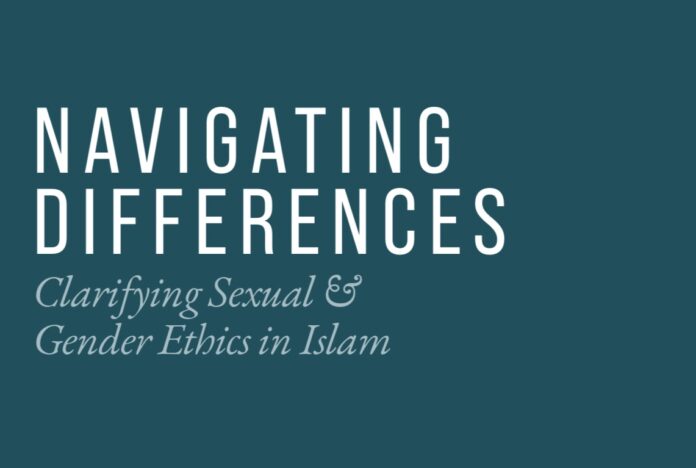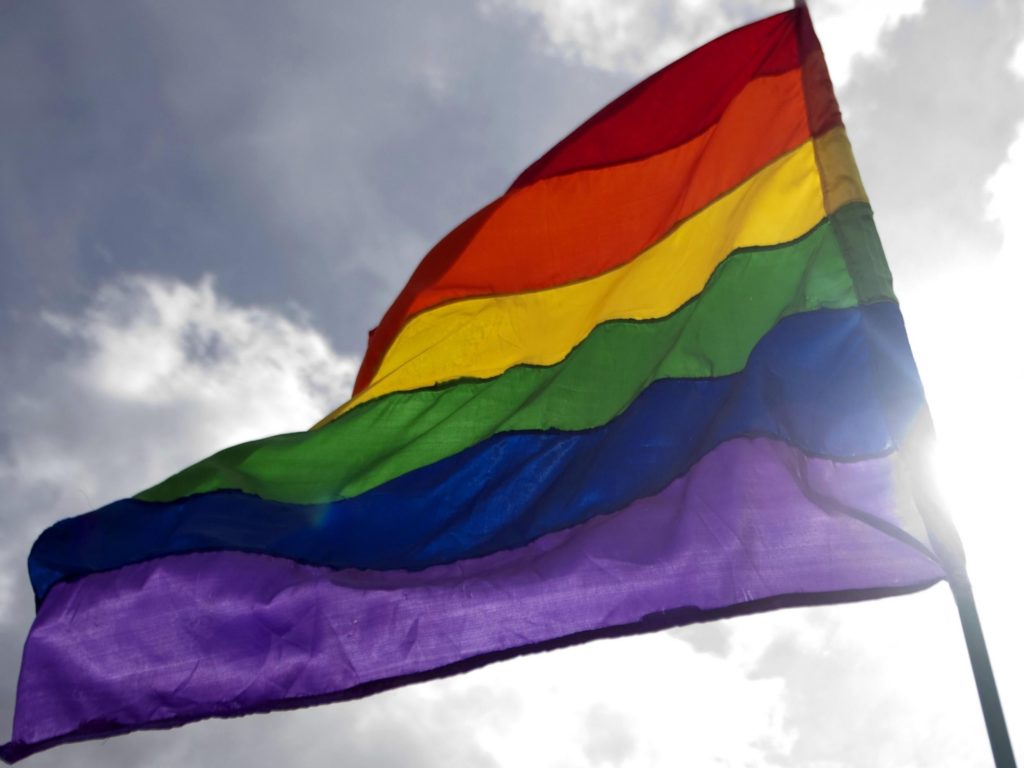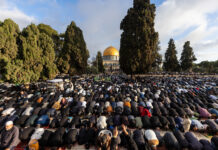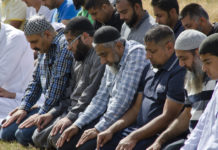More than 130 prominent Muslim scholars from North America have issued a statement defending the Muslim community’s right to maintain the normative Islamic position on LGBTQ without being accused of bigotry or hatred.
The scholars, who include Imam Siraj Wahaj, Imam Suhaib Webb, Shaykh Shadee Elmasry, Shaykh Yasir Qadhi, Imam Omar Suleiman and the Canadian Council of Imams, say that Islamic sexual and gender ethics are at odds with general society’s views, which has caused tension for Muslims between their religious beliefs and societal expectations.
But they say the normative Islamic position on LGBTQ, which is derived from the Quran, is fixed and cannot be changed. “As a religious minority that frequently experiences bigotry and exclusion, we reject the notion that moral disagreement amounts to intolerance or incitement of violence,” their statement reads. “We affirm our right to express our beliefs while simultaneously recognizing our constitutional obligation to exist peacefully with those whose beliefs differ from ours.”
The scholars also reject any attempts to reinterpret or revise religious doctrine to be inclusive of LGBTQ ideology. “The Muslim community is not immune to such pressures,” they say. “Indeed, some have attempted to reinterpret Islamic texts in favor of LGBTQ affirmation. We categorically reject such efforts as theologically indefensible because these aspects of sexual ethics fit within the category of immutable tenets and are therefore not subject to revision.”
But they conclude that they are committed to peaceful co-existence with those who differ in North America.
“Peaceful coexistence does not necessitate agreement, acceptance, affirmation, promotion, or celebration. We refuse the false choice between succumbing to social pressures to adopt views contrary to our beliefs or facing unfounded charges of bigotry. Such coercive ultimatums undermine prospects for harmonious coexistence.”
Below is the statement in full with a list of signatories at the end:
Subscribe to our newsletter and stay updated on the latest news and updates from around the Muslim world!
Public discourse on sexuality over the past few decades has presented challenges to faith communities. Today, Islamic sexual and gender ethics are at odds with certain recently popular societal views, causing tension for Muslims between their religious beliefs and societal expectations. At the same time, public disapproval of LGBTQ practices, beliefs, and advocacy is increasingly met with charges of intolerance and unwarranted accusations of bigotry. More troubling still, there is an increasing push to promote LGBTQ-centric values among children through legislation and regulations, disregarding parental consent and denying both parents and children the opportunity to express conscientious objection. Such policies subvert the agency of Muslim parents to teach their children their religiously grounded sexual ethics, violate their constitutional right to freely practice their religion, and contribute to an atmosphere of intolerance toward faith communities.
We are Muslim scholars and preachers representing a diverse range of theological schools. Below is our collective, non-partisan articulation of Islam’s position on sexual and gender ethics. As a religious minority that frequently experiences bigotry and exclusion, we reject the notion that moral disagreement amounts to intolerance or incitement of violence. We affirm our right to express our beliefs while simultaneously recognizing our constitutional obligation to exist peacefully with those whose beliefs differ from ours.
The Source of Morality for Muslims
The most essential requirement for accepting Islam is to submit to God completely, voluntarily, and lovingly. God says, “It is not for a believing man or woman—when God and His Messenger decree a matter—to have any other choice in that matter” (Quran, al-Aḥzāb:36). By submitting to God, we declare that only He possesses absolute knowledge and wisdom. Therefore, it follows from this submission that the ultimate source and basis of morality is Divine guidance, not just reason or societal trends.
Islam enjoys a rich tradition of jurisprudence that allows for diverse perspectives and accommodates various cultural norms. However, particular principles that are explicitly stated in revelation, known to be necessary elements of Islam, and unanimously agreed upon by qualified scholars are deemed immutable and not open to revision by any person or entity, including the highest religious authorities. As God asserts, “And the word of your Lord has been fulfilled in truth and justice. None can alter His words, and He is the All-Hearing, the All- Knowing” (Quran, al-An‘ām: 115).
Islam’s Position on Sexuality and Gender
By a decree from God, sexual relations are permitted within the bounds of marriage, and marriage can only occur between a man and a woman. In the Quran, God explicitly condemns sexual relations with the same sex (see, e.g., Quran, al-Nisā’: 16, al-A‘rāf: 80–83, and al-Naml: 55–58). Moreover, premarital and extramarital sexual acts are prohibited in Islam. As God explains, “Do not go near fornication. It is truly an immoral deed and a terrible way [to behave]” (Quran, al-Isrā’: 32). These aspects of Islam are unambiguously established in the Quran, the teachings of Prophet Muhammad (peace be upon him), and a chain of scholarly tradition spanning fourteen centuries. As a result, they have gained the status of religious consensus (ijmā‘) and are recognized as integral components of the faith known to the general body of Muslims.
God defined humanity as consisting of males and females and declared that He “… created [humans] from a male and a female and made [them] into peoples and tribes so that you may come to know one another” (Quran, al-Ḥujurāt: 13; see also al-Najm: 45). Islam affirms that men and women are spiritually equal before God, even though each has different characteristics and roles. The Prophet Muhammad (peace be upon him) referred to women as equivalent counterparts of men. Yet, he (peace be upon him) explicitly condemned imitating the appearance of the opposite gender. Further, God calls on humanity to respect His wisdom in creation (see, e.g., Quran, al-Nisā’: 119). As such, as a general rule, Islam strictly prohibits medical procedures intended to change the sex of healthy individuals, regardless of whether such procedures are termed gender “affirming” or “confirming.” For individuals born with biological ambiguities, such as disorders of sexual development, Islam permits them to seek medical care for corrective reasons.
Islam distinguishes between feelings, actions, and identity. God holds individuals accountable for their words and actions, not for their involuntary thoughts and feelings. As our Prophet (peace be upon him) said, “God has pardoned Muslims for what they think, as long as they do not speak of or act on it” (Bukhari, 2528). In Islam, the sinful actions of an individual do not and should not dictate his or her identity. As such, it is impermissible for Muslims to take pride in identifying with labels that categorize them by their sins. It is important to note that the stance of Islam on illicit sexual relations goes hand in hand with its protection and promotion of the individual’s right to privacy. Islam prohibits prying into others’ private lives and discourages public disclosure of sexual behavior (see, e.g., Quran, al-Ḥujurāt: 12 and al-Nūr: 19).
We recognize that some religious groups have reinterpreted or revised religious doctrine to be inclusive of LGBTQ ideology. The Muslim community is not immune to such pressures. Indeed, some have attempted to reinterpret Islamic texts in favor of LGBTQ affirmation. We categorically reject such efforts as theologically indefensible because these aspects of sexual ethics fit within the category of immutable tenets and are therefore not subject to revision.
Our Constitutional Right to Hold Our Views
We recognize that our moral code conflicts with the goals of LGBTQ proponents. We also acknowledge their constitutional right to live in peace and free from abuse. Nevertheless, we emphasize our God-given and constitutional rights to hold, live by, and promote our religious beliefs in the best manner (Quran, al-Naḥl: 125) without fear of legal reprisal or systematic marginalization. Peaceful coexistence does not necessitate agreement, acceptance, affirmation, promotion, or celebration. We refuse the false choice between succumbing to social pressures to adopt views contrary to our beliefs or facing unfounded charges of bigotry. Such coercive ultimatums undermine prospects for harmonious coexistence.
We call on policymakers to protect our constitutional right to practice our religious beliefs freely, without fear of harassment, and to oppose any legislation seeking to stifle the religious freedoms of faith communities. Consistent with our claim of non-partisanship, we are committed to working with individuals of all religious and political affiliations to protect the constitutional right of faith communities to live according to their religious convictions and to uphold justice for all.
To Our Muslim Community
We urge Muslim public figures to uphold the sanctity of our faith and refrain from making erroneous pronouncements on behalf of Islam. We reject any attempt to attribute positions to Islam concerning sexual and gender ethics that contravene well-established Islamic teachings. To be clear, we cannot overstate the detrimental spiritual consequences for those who intentionally reject, advocate the rejection of, or misrepresent the will of God, as in doing so they endanger their status as believers (Quran, al-An‘ām: 21).
To those among us who struggle with desires that fall outside the boundaries set by God: know that even the most righteous can commit sins and that every Muslim, no matter how sinful, has the potential to be forgiven. Practicing self-restraint in devotion to God is considered heroic. Its spiritual reward increases proportionally with the level of struggle involved. Our ultimate purpose is to prioritize devotion to God over our desires and not sacrifice our faith. We pray to God to grant us the necessary strength and unwavering commitment to live up to our ideals. May we find inner peace and satisfaction through loving submission, and may God deem us worthy of being counted among the believers, the most honorable of titles.
Shaykh Tameem Ahmadi
Nur Institute
Shaykh Hatem al-Hajj, PhD
Assembly of Muslim Jurists of America
Shaykh Salah al-Sawy, PhD
Assembly of Muslim Jurists of America
Shaykh Ammar Alshukry
AlMaghrib Institute
Professor Ovamir Anjum, PhD
Ummatics Institute
Ustadha Zaynab Ansari
Tayseer Institute
Imam Navaid Aziz
Islamic Information Society of Calgary
Shaykh Jamal Badawi, PhD
Fiqh Council of North America
Professor Ihsan Bagby, PhD
Fiqh Council of North America
Shaykh Nomaan Baig
Institute of Knowledge
Shaykh Waleed Basyouni, PhD
AlMaghrib Institute
Shaykh Ahmed Billoo
Institute of Knowledge
Imam Yaser Birjas
Valley Ranch Islamic Center
Professor Jonathan Brown, PhD
Georgetown University
Canadian Council of Imams
Representing 80 Canadian Imams
Professor Sharif El-Tobgui, PhD
Boston Islamic Seminary
Shaykh Alauddin Elbakri
Tawasaw
Shaykh Shadee Elmasry, PhD
NBIC Safina Society
Shaykh Mohammad Elshinawy
Mishkah University
Imam Tom Facchine
Yaqeen Institute for Islamic Research
Shaykh Yasir Fahmy
Prophetic Living
Shaykh Mohammed Faqih
Memphis Islamic Center
Shaykh Yassir Fazzaga
Memphis Islamic Center
Shaykha Hanaa Gamal
Fiqh Council of the Islamic Society of Greater Houston
Professor Abdullah Bin Hamid Ali, PhD
Zaytuna College
Shaykh Suleiman Hani
AlMaghrib Institute
Shaykh Asif Hirani, PhD
Islamic Circle of North America
Shaykh Omar Husain, PhD
Shaykh AbdulNasir Jangda
Qalam Institute
Shaykh Abdur Rahman Khan
The Shariah Council of Islamic Circle of North America
Shaykh Ahmad Kutty
Ustadha Fatima Lette
Qalam Institute
Shaykh Mohammed Amin Kholwadia
Darul Qasim College
Shaykh Hamzah Maqbul
Ribat Institute
Ustadh AbdelRahman Murphy
Roots Community
Shaykha Ieasha Prime
Barakah Inc. Leadership Institute
Shaykh Yasir Qadhi, PhD
Islamic Seminary of America
Shaykh Yahya Rhodus, PhD
Al-Maqasid Islamic Seminary
Imam Jihad Saafir
Islah LA
Ustadha Aatifa Shareef, LPC
Qalam Institute
Shaykh Muzzamil Siddiqi, PhD
Fiqh Council of North America
Imam Syed Soharwardy
Islamic Supreme Council of Canada
Shaykh Zulfiqar Ali Shah, PhD
Fiqh Council of North America
Shaykh Omar Suleiman, PhD
Yaqeen Institute for Islamic Research
Ustadh Amjad Tarsin
Al-Maqasid Islamic Seminary
Shaykh Saad Tasleem
AlMaghrib Institute
Shaykh Mustafa Umar
California Islamic University
Ustadh Mobeen Vaid
Shaykh Abdullah Waheed
Miftaah Institute
Mufti Abdul Rahman Waheed
Miftaah Institute
Imam Siraj Wahhaj
Al-Taqwa Mosque (Brooklyn, NY)
Shaykh Dawud Walid
Shaykha Aysha Wazwaz, PhD
Gems of Light Institute
Imam Suhaib Webb
Institute of Sacred Sciences
Shaykh Tahir Wyatt, PhD
United Muslim Masjid
Shaykha Haifaa Younis, MD
Jannah Institute
Shaykh Jamaal Zarabozo
Shaykh Abu Zayd, PhD
Quran Literacy Institute
Shaykh Furhan Zubairi
Institute of Knowledge
























